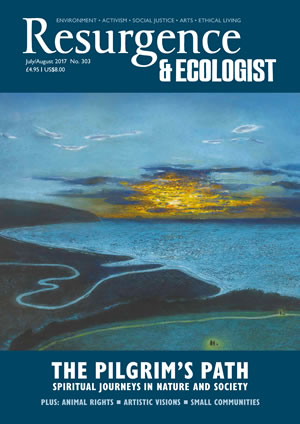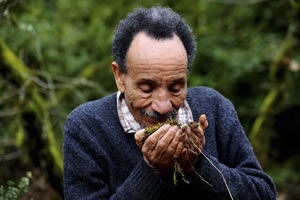Satish Kumar: Our modern, urban society has become disconnected from Nature. Why is it important for people to be reconnected with Nature?
Pierre Rabhi: Because we are the children of Nature! A journalist came to see me recently to ask me some questions about water. I said to her: “Madame, you are water.” We are water, we are soil, we are air, we are Nature. That is what we are made of. It’s the mind that created the separation between Nature and us. That separation is not real and that’s why it’s so important today to come back to the source – that is, back to Mother Earth herself.
More and more people are living in cities and working in offices and factories, for corporations. How can you make them understand that they need to reconnect? They need money. They need to pay their bills. They don’t think that they need to go back to Nature.
That’s not quite true. In France, we work for eleven months of the year and we have one month’s holiday. During that month’s holiday, everyone goes to the mountains or to the seaside. So the need to reconnect with Nature is there.
One of the symbols of modern society being disconnected from Nature is the necktie, because it’s a running knot, just like a noose. Symbolically speaking, that’s quite terrifying. It implies subordination to an unnatural system. As soon as you’ve finished work, you take your tie off. But why put a tie on in the first place? [{cite}Laughter{/cite}] For me, it’s a symbol of voluntary subjugation. Human beings have been reduced to servitude. They’ve been completely alienated from Nature. The motto of modern society is “Give us your life, and we’ll give you a wage”.
The big cities separate people from Nature. The sun rises and sets and there’s no one there to admire its splendour. Life gifts us with all its beauty, but there’s no one there to admire it, because humans have become imprisoned by an irrational rationale that says that time is money. And also that Nature is a source of making money.
People believe that time is money. Now they have money but no time.
Exactly. There’s a story about this:
There’s this fisherman who has finished his work for the day, so he’s resting on the beach while his nets dry.
A businessman walks by, sees the fisherman and stops. He says to the fisherman: “Is that rowing boat yours? It’s very small. You could have a bigger boat.”
The fisherman says: “Then what?”
“Well, if you had a bigger boat, you could catch a lot more fish. Then you could buy an even bigger boat, because you’d have earnt more money.”
The fisherman says: “Then what?”
“Well, then you could hire some employees to go out and fish for you.”
The fisherman says: “Then what?”
“Well, then you could rest!”
The fisherman says: “But that’s exactly what I’m doing right now.” Laughter
That’s what’s so absurd about the modern system that says, “Always more, never enough”. Modern society lives in overabundance but consumes a lot of tranquillisers. So we really need to think about what the ideal mode of existence is – one that can allow us not just to have, but also to be.
It is believed that progress, development and economic growth raise people’s living standards.
It’s an illusion. I’ve seen people who really have very little and yet they are happy. Happiness can’t be built with material things. Material things can give us pleasure, but they don’t necessarily give us joy. Joy is something else. It’s a different essence. In a way, you could say that it’s a divine essence. We can’t manufacture joy: we can only open up to joy. It’s not something we can conquer.
But people are living the illusion and they are not happy. That’s why they consume so many drugs – to try and have the impression that they are happy. Many in modern society are victims of a great illusion that more means better, but more does not necessarily mean better. However, things are beginning to shift. People are starting to realise that material abundance does not necessarily bring joy.
In a way, people are in revolt. If you take the examples of Brexit and Trump, it shows that people are in revolt about something, but this revolt is not quite as positive as we would hope. Even Le Pen in France is attracting lots of people, but the ecology movement and the organic movement are not attracting enough people. It’s a difficult struggle.
That’s because people are very far removed from the land. We’ve created cities that are like soilless cultures. Human beings living in these cities aren’t even aware where their food comes from! We grow our food in soil that’s dead. And then we put that food into our bodies. Someone once said that, when you sit down to a meal, instead of saying “Bon appétit” you should really say “Bon courage (‘Good luck’)!” [{cite}Laughter{/cite}]
People have become unconscious consumers and as a result they think less and less. This makes human beings vulnerable because, when they have no point of reference beyond what they have been taught, outside that confinement they obviously become very easy to manipulate. And then you find out that the whole rationale on which society is based gives all the power to 1,300 dollar billionaires who determine world politics. It is these people who have the real power. So we can say that the citizens have been taken hostage by a rationale and we’ve managed to convince them that it’s the right rationale. As soon as that happens, human beings no longer have any power of initiative. And that’s the situation we are currently in. I believe we need to work towards change.
In France, we’re organising a civic forum that will show the amazing initiatives that already exist in civil society. It’s going to start soon. It’s being organised by Colibris (‘Hummingbirds’). Colibris does a lot to raise citizen awareness.
Have you heard the Native American legend about the hummingbird? According to this legend, there was once a huge forest fire. All the animals were terrified, completely distraught, and were helplessly watching the fire. Only the tiny hummingbird was busy, flying back and forth to a nearby river, fetching a few drops of water in its beak and throwing them on the fire.
After a while, an armadillo, who was starting to get annoyed by the hummingbird’s useless toing and froing, cried out: “Hummingbird, have you gone completely mad? You’re never going to put the fire out with those tiny drops of water!”
The hummingbird replied: “I know that, but I’m doing my bit.”
The Colibris movement is really starting to grow all over France. People are starting to say, “Hey, I can do something,” and they do it. If I can do something small, then I do something small. If I can do something bigger, then I do that. But the important thing is to act, to do something. No matter how big or how small, everyone does his or her bit. Otherwise, citizens feel helpless and think they can’t do anything about what’s happening.
Are you saying that citizens should take power into their own hands?
Absolutely. Peacefully, without any violence. But they need to take power into their own hands because the politicians… Well, the way I see it is that politicians practise a form of dysthanasia. They are trying at all costs to keep a rationale of modernity alive, but it’s already dead. When I ran for president in the 2002 elections in France, my slogan was “A call for an uprising of consciousness”. Today, it’s no longer about the sociology of individuals: it’s all about the sociology of consciousness.
Do you suggest that people who are ecologically minded should go into politics and fight elections?
There is an Ecology party in France, but unfortunately they only talk about facts, about material things. Today, in Europe, people are sad. They’re disenchanted. There’s no joy left. Nature is joy; a political party isn’t. Nature concerns everyone. Whether the president of the republic or a road sweeper, everyone is affected by Nature. So our task is to move ecology from a political level to the level of consciousness. That’s why it’s so important for each individual to feel that he or she is a child of Nature. When that happens, there’ll be an elevation of consciousness. So, yes, I fought an election, but now I think that we should build our movement from the bottom up and that even the Ecology party should work at the grassroots level.
People are in the education system for 15 years. They are brainwashed, conditioned to think that the only purpose in life is to earn money, buy a car, buy a house, etc. For 15 years…
That’s what’s known as alienation. And it isn’t just that. When the system doesn’t need someone any more, that person is discarded. Today, we have disposable humans, just like we have disposable napkins – when they no longer need you, they just throw you away.
When you analyse things objectively, you see a humanity that attaches much more importance to death than to life. We invest so much money in manufacturing weapons to kill, and we neglect life. For me, this proves that humanity is suffering from a serious illness, a collective illness. It’s important to cure this illness; otherwise humanity is heading towards its own destruction.
How can we cure this illness? How do we bring about healing?
I have a utopian vision. I believe that if, on an international level, we stop manufacturing weapons, if we teach children about cooperation instead of competition, if we teach them to respect Nature, to respect life, if we balance feminine and masculine energies, if we do all that, we will be able to initiate a process that will enable humanity to survive.
But this utopian vision is a long way away! At the moment we have taken absurdity to a whole new level. There’s a new form of obscurantism that masquerades as science. In our culture, when you say something is scientific, no one challenges it. We say “It’s scientific” when we want to confirm and validate something, yet science has done many bad things. That’s why I think we are seeing an evolution of the collective mind that is quite dangerous.
So science has done many bad things. Can you give some examples?
Weapons, chemicals... Agronomists are trained to use chemicals and put them in the soil. Pharmaceutical laboratories make enormous amounts of money while polluting the environment. There are some very negative sides to modern medicine because it doesn’t consider the patient as a whole. It’s all about prescribing drugs – you have such-and-such an illness, so you take such-and-such a drug. It does not take into account the fact that you can be physically ill because of something that’s going on in your mind. It’s all connected, but medicine has been reduced to simply prescribing drugs. Of course, there is one positive development that we can’t ignore, and that’s surgery. Provided we don’t overdo it… People used to die of things like appendicitis, but today they can be saved through surgery.
So what you need is for science to be accompanied by some spiritual values?
Yes, because it is humans who decide whether they want to develop science for good or for evil. When we manufacture weapons, we are developing science for evil, but when we find a new cure that will save people, we are developing it for good.
With thanks to Louise Lang for translating this interview, which took place in Aix-les-Bains. A shortened version of this article appeared in the July/August issue of Resurgence & Ecologist magazine.








